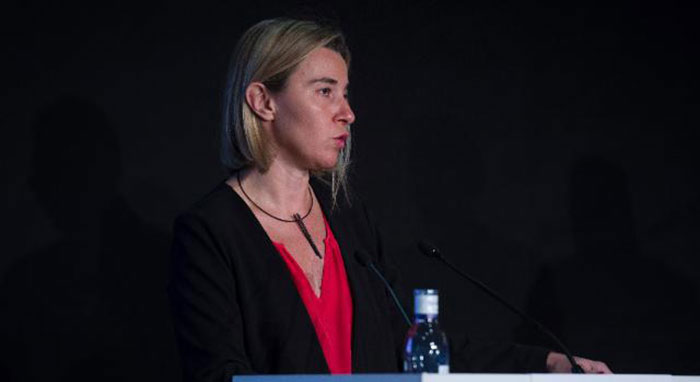EU Global Strategy Conference organised by EUISS and Real Institute Elcano, Barcelona
Extracts:
The times we live in call for unity, and for rationality.(…)
They [terrorists] are trying to divide us (…) inside our own societies, first of all.
The terrorists also want to divide us from our Arab and Muslim friends, here and in our region. Dae’sh is using the narrative of religion to expand their own influence, and to spread an ideology that feeds on fear. Their un-holy war has nothing to do with faith. It is a struggle for power, dressed up in the narrative of an apocalyptic clash between a self-branded Caliphate and the rest of the world. Let us move beyond this narrative, and think with our own minds. Muslim countries are on the frontline of the fight against Dae’sh. Muslims are the first victims of Dae’sh. As a friend told me a few days ago, a minister of a country that knows terrorism well: they attack mosques, how can they claim to be fighting for religion? It’s a pure, traditional, old, and dirty fight for power.
Thirdly, the terrorists want to divide the international community. (…) Only a pacified Syria – heading towards national reconciliation – can lay the ground for a long lasting defeat of Dae’sh. And a pacified Syria calls for a united international community. (…) We need unity more than ever. If we gave up our efforts to start off a political transition, we would only be playing Dae’sh’ game.
There is one mistake we must not make, one mistake we cannot afford today. We cannot act impulsively. We cannot act without a strategy, a vision on what we want to achieve, and how we want to get there.
The new Global Strategy will describe the priorities and the principles of our external action, knowing that internal and external actions have many points in common.
A starting point for our work is the close link between our internal and external policies and the effect this has on our security. (…)
I will focus on two main principles. One is consistency, the other is responsible engagement.
Consistency means that our external and our internal action must be guided by the same interests and the same values. (…)
Our dream of open borders in our Union is one of Europe’s great achievements, a great achievement we now see questioned. So we need to ask ourselves some serious questions. Can we have open borders without sharing intelligence that is crucial to our mutual security?
(…) Fighting Dae’sh and other extremists groups is about Syria and Iraq, it’s about Libya and the Sahel, but it is also about what we do right here at home. And we see it very clearly in these difficult weeks. It is about helping young people find good jobs, and finding a place in our societies for those who feel alienated and left out. It’s about sending a message of unity, of belonging, of inclusion. Defeating the terrorists’ threat is our project, internally and externally.
On our external work, the second principle I’d like to talk about is engagement. In today’s world there is no way we can isolate ourselves from the outer world. (…) But such engagement cannot be solitary. No power in the world can carry the whole world on its shoulders. Many have tried, and all have failed. Responsible engagement goes together with partnership.
(…) This strategy is not only about foreign policy; it can be and must be about us as Europeans. About who we are, how we work together and what we share as Europeans. It is about shaping a European public opinion, on how we see the world, and how we want the world to see us. It is about our common European interest. It is about our role in the world, but it is also about us. (…)



